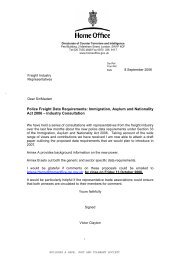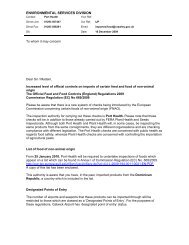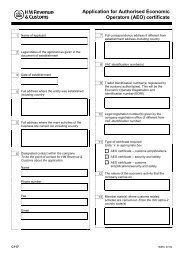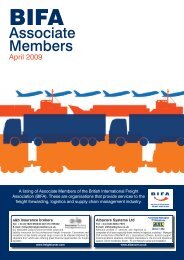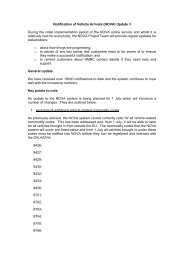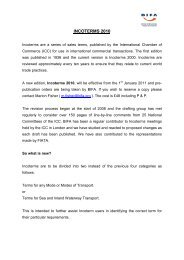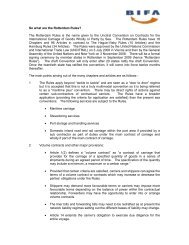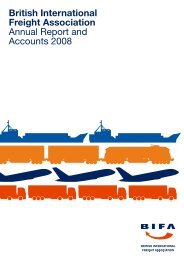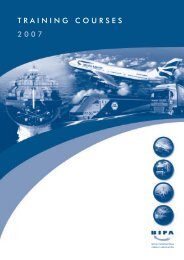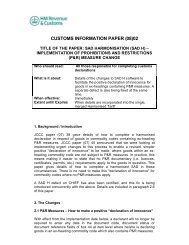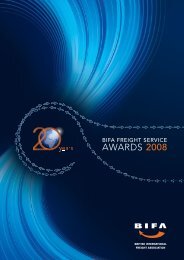BIFAlink cover - British International Freight Association
BIFAlink cover - British International Freight Association
BIFAlink cover - British International Freight Association
- No tags were found...
Create successful ePaper yourself
Turn your PDF publications into a flip-book with our unique Google optimized e-Paper software.
tradeservices<br />
www.bifa.org<br />
Risk: how to cope<br />
with the unexpected<br />
<strong>Freight</strong> forwarders inevitably face the danger of the unconsidered event.<br />
Here BIFA looks at some of the unexpected developments that catch<br />
operators out, and makes some suggestions on how to be as prepared<br />
as possible<br />
The recent world economic<br />
downturn has highlighted<br />
weaknesses in the global supply<br />
chain. These range from relatively<br />
simple and speedily fixed problems<br />
to those with the ability to force<br />
companies out of business. The<br />
three most frequently noted types of<br />
risk can be summarised as:<br />
● Economic risk<br />
● Compliance risk<br />
● Supply chain risk.<br />
Economic risk<br />
The recent global recession<br />
adversely impacted on many companies;<br />
the movement of goods was<br />
largely an unacknowledged reality.<br />
Goods were ordered and delivered<br />
to their final destination as if by<br />
magic. How the goods reached their<br />
destination, and the complexity of<br />
the many processes involved in<br />
achieving this movement, was not<br />
appreciated by many at board level.<br />
But now directors and senior<br />
managers increasingly realise that<br />
they should be managing this important<br />
function to a greater extent than<br />
in the past.<br />
It is now acknowledged that<br />
there is a greater degree of risk in<br />
the supply chain than was previously<br />
thought. Dependent on the nature<br />
of the risk, it may be possible for a<br />
company either to control or mitigate<br />
the impact by dual sourcing,<br />
moving manufacturing closer to the<br />
point of consumption, increasing<br />
stock levels and, where appropriate,<br />
An accident in Mobile Bay,<br />
Alabama, involving a<br />
containership and a crane<br />
USCG<br />
offering financial assistance or<br />
purchasing key suppliers.<br />
Compliance risk<br />
Compliance is a word that is increasingly<br />
used in relation to all elements<br />
of the supply chain. New legislation<br />
and regulations impacting on trade<br />
have the ability to disrupt it. For<br />
instance EU Regulation 669, <strong>cover</strong>ing<br />
high risk foods and feedstuffs<br />
from specific destinations, has<br />
created considerable disruption due<br />
to higher inspection levels, the<br />
increased costs of undertaking the<br />
relevant laboratory analysis, and<br />
delays whilst these are undertaken.<br />
Whilst this example relates to a<br />
specific issue, we would like to highlight<br />
an environmental issue with<br />
the potential to increase sea freight<br />
costs. The Baltic, the North Sea and<br />
English Channel have been declared<br />
Sulphur Emission Control Areas<br />
(SECAs).<br />
Ships operating in these waters<br />
have, since 1 July 2010, had to<br />
reduce sulphur content in their<br />
marine fuel from the international<br />
level of 4.5%, to 1%, with a further<br />
reduction to 0.1% from 1 January<br />
2015.<br />
This reduction to 0.1% will<br />
require a move away from residual to<br />
distillate fuel, which could further<br />
increase marine fuel costs by 40% to<br />
70%, dependent on location. Due to<br />
these changes, shortsea shipping<br />
(including freight and passenger<br />
vessels) will see a sharp increase in<br />
its cost base from 2015. These<br />
significant cost increases may force a<br />
switch from maritime to road for<br />
moving goods within Continental<br />
Europe and, to a lesser extent, the<br />
UK.<br />
At BIFA we hear of numerous<br />
instances where freight forwarders<br />
become embroiled in disputes due<br />
to legislative regulatory changes. To<br />
give a recent example, BIFA was<br />
contacted by a forwarder who had<br />
exported certain chemicals to China.<br />
When the goods were shipped it was<br />
legal to import them into China, but<br />
whilst the goods were in transit a<br />
change in the law made it illegal to<br />
do so.<br />
This simple example clearly<br />
demonstrates that all parties must be<br />
aware of their legal obligations and<br />
communicate with their partners to<br />
prevent such problems occurring.<br />
8 November 2010



